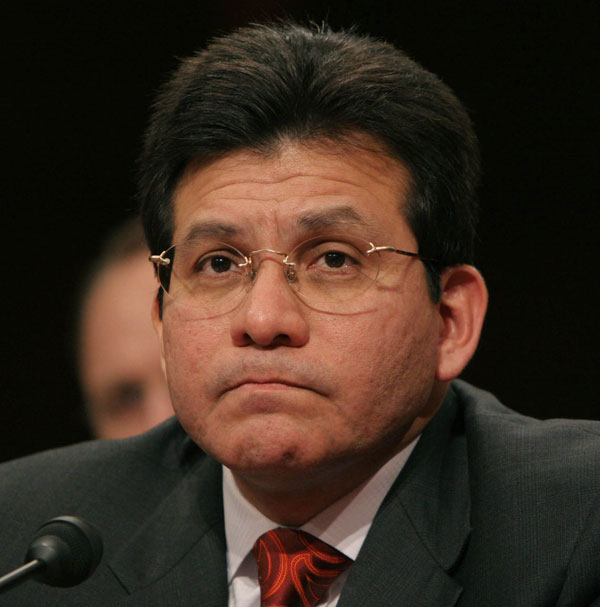Ideology of Judges Determine Asylum Seekers’ Fate
Jul 31, 2020274.1K Shares5.4M Views
Former Attorney General Alberto Gonzales (WDCpix)
In August 2006, then-Atty. Gen. Alberto Gonzales unveiled a 22-point planto rescue the severely strained immigration court system. Gonzales vowed to better assist and police the more than 200 U.S. immigration judges, who are civil servants in the Executive Office for Immigration Review at the Justice Dept.
Each year, these judges issue more than 300,000 rulings on whether an undocumented immigrant seeking asylum in the United States can stay or must be deported. Despite the often life-and-death circumstances of these cases– most refugees seeking asylum claim to be fleeing political or religious persecution — individual judges are forced to make quick decisions. The average judge determines the fate of 27 asylum seekers a week, more than five each business day.
So it was no surprise that the Gonzales plan was based on the Justice Dept. making a budget request for more immigration judges. But at a congressional hearing Tuesday, Keivn Ohlson, director of the Executive Office of Immigration Review testified that the department budget for next year does not ask for more judges.
Democrats and immigration law experts say this failure to move forward in hiring reveals an immigration court system in a state of disrepair. The hiring process became a national scandal after a Justice Dept. auditrevealed that more than 40 of these career civil servants were illegally hired — based on their loyalty to the Republican Party.
But the hiring practices of former Justice Dept. officials Kyle Sampson, Jan Williams and Monica Goodling are only part of the story. The hearing of the House Judiciary Committee immigration subcommittee also highlighted the fact that an asylum seeker’s fate can depend on the ideology and background of individual judges— judges that remain overburdened with cases.
“How can 215 immigration judges be expected to handle 300,000 cases a year?” said Rep. John Conyers, (D-Mich.) chairman of the judiciary committee, at the hearing. “It’s a crushing workload and an appellate mess — this is awful.”
Conyers, who has previously held hearings on the politicization in the hiring of career Justice Dept. officials, instead chose to focus his questions on the department’s not following up on several reforms proposed by Gonzales — including the hiring of more judges. The Michigan Democrat argued that the end of politicized hiring shouldn’t give the sense that “everything is going forward and everything is going smoothly.”
“What’s the deal with the budget?” Conyers asked Lee Loftus, asst. attorney general for administration. “Everybody knows we need we more judges and a lot more appeal board members. But in 2009, DOJ did not request any positions for judges and appeals.”
“You didn’t expect us to come out of the clear blue sky and request judges for you,” Conyers added.
Loftus replied that the administration instead decided to use its budget request to follow-up on the technology improvement measures that were also in 22-point plan.
Some of these improvements have been implemented. For example, immigration hearings are now digitally recorded. Immigration judges previously had to keep their own cassette-tape recording of asylum hearings.
A study this monthby Syracuse University’s Transactional Records Access Clearinghouse, or TRAC, credited the Justice Dept. with these technological improvements. But it also found that the main problem of immigration courts persists — a lack of resources to fairly process asylum cases.
“Promises have not been kept,” Susan Long, co-director of TRAC, said in an interview. “There is always the natural inertia of any bureaucracy, but reforming the immigration courts just hasn’t been a priority.”
What seems to have been a Justice Dept. priority was hiring immigration judges with ties to the White House and Republican members of Congress, according to a Justice Dept. inspector general report released in July. The now infamous audit found that Sampson, the chief of staff for Gonzales, took control of hiring immigration judges from the office of immigration review.
Sampson has said that he mistakenly believed the immigration judges were political appointees, and that he did not have to use the politically neutral criteria required in hiring civil servants. Sampson then delegated the process to Williams, the White House liaison, and later to Goodling.
The IG report found that the politicized hiring process further increased the workload of immigration judges: Williams and Goodling lengthened the process of hiring new judges by screening candidates to ensure their loyalty to President George W. Bush and adherence to social conservatism.
Data by TRAC show that immigration judges hired because of partisan considerations tend to rule against asylum seeking refugees. Of the 16 politicized hires that have taken on more than 100 cases, nine granted asylum at a rate significantly lower than the national average of about 40 percent.
“Most of the immigration judges that they hired seem to come from the rank of the prosecutors,” Crystal Williams, deputy director at the American Immigration Lawyers Assn., said in an interview. “Certainly those with a prosecution background tend to be on the stingier side of granting asylum.”
Williams’ point is supported by a January 2008 studypublished in the Stanford Law Review that explored the “vast differences in the handling of claims with generally comparable factual circumstances.” Titled “Refugee Roulette,” the study found that former prosecutors are far less likely to grant asylum than judges who formerly worked at non-profits or academia.
It more generally found a stunning lack of uniformity in asylum decisions. For example, a Chinese national applying for asylum at an immigration court in Atlanta has a seven percent chance of being able to stay in America. But they have a 76 percent chance in Orlando.
“Immigration judges make diametrically opposed decisions that seem to have little to do with the actual facts of the case,” said Rep. Zoe Lofgren, (D-Calif.) chairwoman of the Immigration, Citizenship, Refugee, Border Security and International Law judiciary subcommittee that held the hearing.
But with Congress set to leave Friday for the election recess, reforming the immigration courts will probably be put on the back-burner. Rep. Steve King, (R-Iowa) ranking Republican on the subcommittee, pointed out that even if the Justice Dept. had requested more immigration judges, Congress would still be months away from approving their budget.
“This Congress hasn’t passed one appropriations bill for fiscal year 2009,” King said. “There has never been a time that we have gone this far in the history of a Congress and not passed an appropriations bill.”
Indeed, the problem of administering justice to thousands of immigrants is now one for the next administration and Congress to deal with — or not.

Hajra Shannon
Reviewer
Hajra Shannona is a highly experienced journalist with over 9 years of expertise in news writing, investigative reporting, and political analysis.
She holds a Bachelor's degree in Journalism from Columbia University and has contributed to reputable publications focusing on global affairs, human rights, and environmental sustainability.
Hajra's authoritative voice and trustworthy reporting reflect her commitment to delivering insightful news content.
Beyond journalism, she enjoys exploring new cultures through travel and pursuing outdoor photography
Latest Articles
Popular Articles

